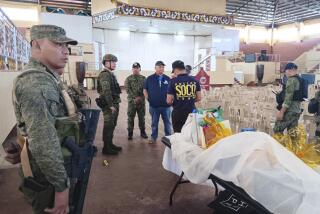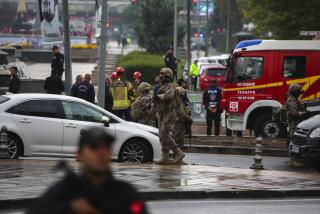Suicide Bomber, 6 Others Die in Sri Lankan Attack; Tamil Rebels Blamed
- Share via
COLOMBO, Sri Lanka — A suicide bomber triggered an explosion Friday outside an eye hospital in central Colombo, killing himself and six others a few minutes after the Sri Lankan health minister and World Health Organization officials had driven by.
No one claimed responsibility for the blast, which injured 24 people, four critically.
But police blamed the Liberation Tigers of Tamil Eelam, or LTTE, which has a suicide squad and often carries out such bombings. The rebels, who seldom comment on such attacks, have been battling for a separate area for the minority Tamils in the north and east since 1983. More than 62,000 people have been killed in the war.
Health Minister Nimal Siripala de Silva told the Associated Press that he thought that he was the target of the attack.
“I passed that way just seven minutes before the blast. I suspect I was the target,” De Silva said.
The attack, as well as fresh clashes between government forces and guerrillas in the north of the country, came a day after a special session of Parliament approved the renewal of a nationwide state of emergency that gives wide powers to security forces to combat the LTTE.
The country is also preparing for parliamentary elections Oct. 10. De Silva, a candidate, was seriously wounded in an LTTE suicide bombing attack in 1996 in Jaffna city.
A government statement said 12 LTTE guerrillas were killed in clashes with government troops in the country’s north during the previous 24 hours.
The bloodiest skirmish, in which eight rebels were killed, took place in the Jaffna peninsula’s Ariyalai area, where heavy fighting broke out on during a brief government offensive.
Shortly before the explosion in Colombo, the Sri Lankan capital, World Health Organization officials also drove past the area for a scheduled meeting with De Silva at the Health Ministry. The ministry’s offices are next to the eye hospital.
Fire Department Chief R. K. Nissanka said the bomber triggered the explosion when a policeman approached him for questioning. A civilian had told police that the man was acting suspiciously.
“I heard a big noise and covered my face with my hands and fell down. All I saw was people running everywhere,” said J.W. Ariyawansa, who was heading into the eye hospital for treatment at the time of the blast. His right hand was injured, and a piece of shrapnel was lodged in his head.
The suicide bomber and the policeman were killed instantly in Friday’s attack.
Three people died en route to the National Hospital, and two died after arriving in the emergency ward, said Pushpa Soysa, head of the nurses training unit. Of the 24 injured, 10 underwent surgery and four were in critical condition, Soysa said.
Within hours of the blast, a special police team was searching hotels in the city for suspected LTTE members, said Bodhi Liyanage, deputy inspector general of police.
“It is an emergency operation and will continue until late in the night,” he said.
State television reported that four people were arrested.
The rebels have been blamed for three bombings in the capital this year. In January, a suicide bomber blew herself up near the prime minister’s residence. In March, 31 people were killed in a bombing and shootout near Parliament. In June, a Cabinet minister was assassinated by a suicide bomber.
President Chandrika Kumaratunga was blinded in her right eye Dec. 18 when a suicide bomber tried to assassinate her at an election rally. That blast killed 25 people and injured more than 90.
The rebels have also been blamed for the suicide bomber assassinations of former Indian Prime Minister Rajiv Gandhi in 1991 and Sri Lankan President Ranasinghe Premadasa in 1993.
More to Read
Sign up for Essential California
The most important California stories and recommendations in your inbox every morning.
You may occasionally receive promotional content from the Los Angeles Times.













